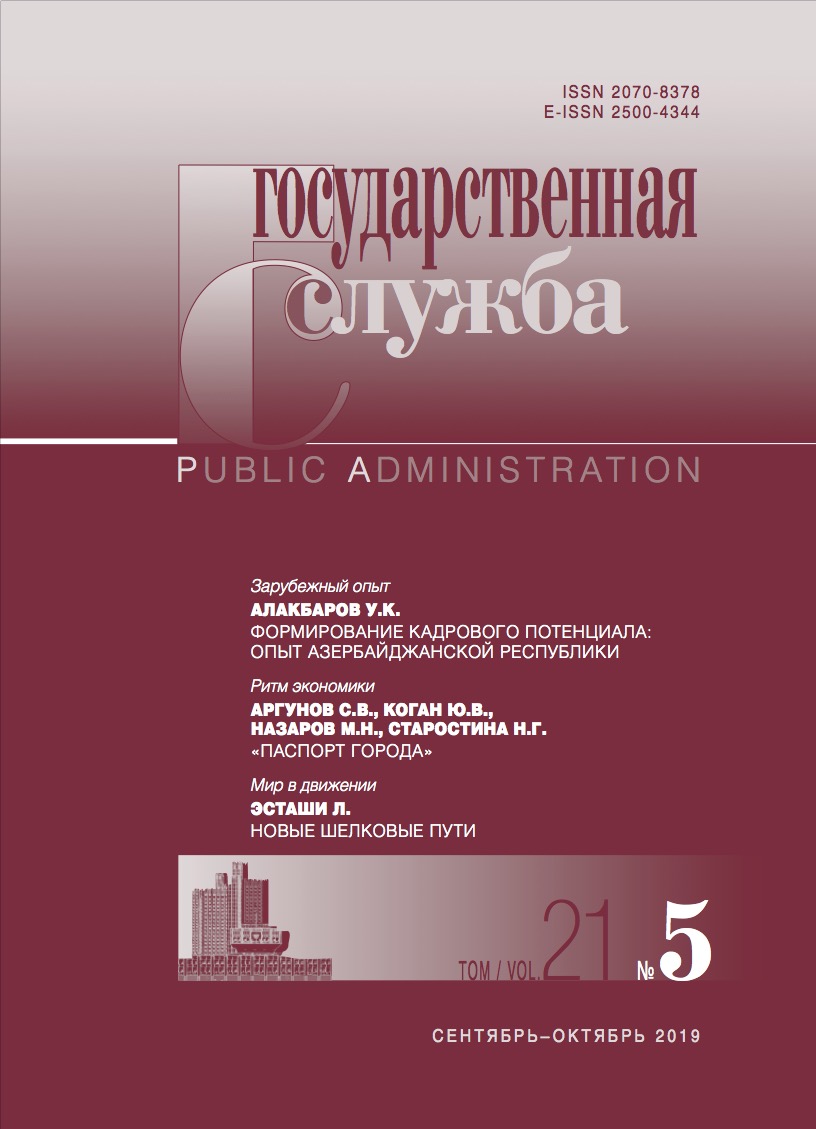Рекомендуемая ссылка на статью:
ЕВГЕНИЯ ДМИТРИЕВНА РАДЬКОа
аРоссийская академия народного хозяйства и государственной службы при Президенте Российской Федерации
DOI: 10.22394/2070-8378-2019-21-5-12-16
Аннотация:
в статье рассматривается взаимосвязь корпоративной культуры служащих и эффективности государственного управления. Автор приводит пример Сингапура – государства, чья система государственной службы является наиболее эффективной, согласно индексу оценки эффективности управления GRICS. Основное внимание в работе уделяется изучению ценностей госслужащих Сингапура как основополагающего элемента их корпоративной культуры, а также механизмов включения таких ценностей в организационные процессы. Изучение опыта Сингапура может быть полезно для создания ценностно-ориентированного института государственной службы в России, отвечающего целям и требованиям государства и общества и соответствующего национальным традициям и менталитету. Важным моментом в поддержке инициативности государственных служащих является формирование так называемой «культуры доверия», которая позволила бы сотрудникам более открыто, безбоязненно делиться своими идеями, указывать на проблемы, зная, что их мнение будет услышано и учтено. Такой подход должен, с одной стороны, привести к выработке наилучшего решения, к которому руководитель не всегда может прийти самостоятельно, а с другой – создать доброжелательную атмосферу в коллективе, сформировать у служащих ощущение собственной значимости и чувство причастности к общему делу и, как следствие, повысить их вовлеченность в трудовую деятельность. Ключевая роль в трансляции ценностей и их включении в организационные процессы принадлежит руководителям. Именно они должны олицетворять идеальный образ государственного служащего, быть для подчиненных лидерами, примерами для подражания и в какой-то степени «вдохновителями».
Abstract:
The article dwells upon the relationship between the corporate culture of civil servants and the effectiveness of public administration. As an example illustrating this dependence, the author cites Singapore – a state whose public service system is most effective, according to the GRICS (Governance Research Indicator Country Snapshot). The article focuses on
Ключевые слова:
корпоративная культура, организационная культура, «культура доверия», ценности, государственное управление, государственная служба, Сингапур
Дата поступления статьи в редакцию:
24 сентября 2018 года
Литература:
Астафьева Е.М. Некоторые аспекты политики «Нациестроительства» в Сингапуре. ЮВА: актуальные проблемы развития. 2010. № 14. С. 278–294.
Барциц И.Н., Борщевский Г.А., Магомедов К.О. Современное состояние и тенденции развития государственной гражданской службы в России: аналитический доклад. М.: ИД «Дело», РАНХиГС. 2018. 136 с.
Ермолов Ю.А. Предметно-содержательные взаимосвязи дефиниций «Организационная культура» и «Корпоративная культура». Вестник ТГУ. 2012. № 9. С. 78–85.
Калмыков Н.Н. Корпоративная культура служащих: сравнительный социологический анализ. Государственная служба. 2015. № 6(98). С. 98–101.
Ли Куан Ю. Из третьего мира – в первый. История Сингапура (1965–2000). М.: Манн, Иванов и Фербер, 2013. 576 с.
Соломанидина Т.О. Организационная культура в таблицах, тестах, кейсах и схемах: Учебно-методические материалы. М.: ИНФРА-М, 2007. 624 с.
Терещук Е.А. Особенности корпоративной культуры государственных служащих в оценках экспертов. Социум и власть. 2010. № 1. С. 24–29.
Arezki R., Quintyn M. Degrees of development. Finance and Development. 2013. Vol. 50. № 1. P. 42–45.
Dahlström C., Lapuente V., Teorell J. The merit of meritocratization: politics, bureaucracy, and the institutional deterrents of corruption. Political Research Quarterly. 2012. Vol. 65. № 3. P. 656–668.
Evans P., Rauch J. Bureaucracy and growth: a cross-national analysis of the effects of «Weberian» state structures on economic growth. American Sociological Review. 1999. Vol. 64. № 5. P. 748–765.
Recanatini F., Prati A., Tabellini G. Why are some public agencies less corrupt than others? Lessons for institutional reform from survey data. Washington, DC: World Bank. 2005. 34 p.
Tan K., Thangara G. The value of values in the Singapore Public Service. ETHOS. 2014. № 13. P. 69–77
Статьи в режиме Open Access публикуются в соответствии с лицензией Creative Commons Attribution 4.0 International (CC BY).

